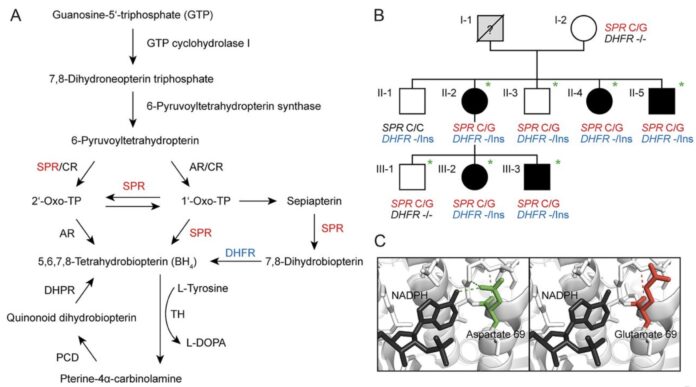Objective: To elucidate the genetic cause of an Egyptian family with dopa-responsive dystonia (DRD), a childhood-onset dystonia, responding therapeutically to levodopa, which is caused by mutations in various genes.
Methods: Rare variants in all coding exons of GCH1 were excluded by Sanger sequencing. Exome sequencing was applied for 1 unaffected and 2 affected family members. To investigate the functional consequences of detected genetic variants, urinary sepiapterin concentrations were determined by high-performance liquid chromatography.
Results: A heterozygous rare nonsynonymous variant in exon 1 of sepiapterin reductase (SPR, c.207C>G, p.Asp69Glu) was found in all affected family members. Urinary concentrations of sepiapterin were above the standard of normal controls in most SPR mutation carriers, suggesting functional biochemical consequences of the mutation. Variant filtering of all genes involved in the tetrahydrobiopterin pathway, required for levodopa synthesis, revealed an additional common variant in dihydrofolate reductase (DHFR, rs70991108). The presence of both variants was significantly stronger associated with the biochemical abnormality and the clinical disease state as opposed to 1 variant only.
Conclusions: The rare SPR mutation can cause autosomal dominant DRD with incomplete penetrance. The common DHFR variant might have synergistic effects on production of tetrahydrobiopterin and levodopa, thereby increasing penetrance.
Shalash A, Roesler T, Mueller S, Salama M, Dueschl G, Mueller U, Opladen T, Petersen B-S, Franke A, Hopfner F, Kuhlenbaeumer G, Hoglinger G. (2017) Novel mutation in sepiapterin reductase causes autosomal dominant dopa-responsive dystonia. Neurology: Genetics. doi:10.1212/NXG.0000000000000197: 2376-7839

Executive Director, Global Brain Health Institute, San Francesco, USA
Victor Valcour is the executive director of GBHI and brings a passion for and experience in international collaboration to GBHI. His research and clinical work offer unique opportunities for GBHI fellows and scholars to understand the connections between ageing and cognitive disorders with a global perspective. Valcour’s current work aims to improve brain health around the world by training health care providers to meet community needs by utilizing local resources. He is an advocate for underserved populations and a voice of change for how we perceive elders and their role in society.
Victor Valcour is an internist and geriatrician at the Memory and Aging Center at the University of California, San Francisco where he is a professor of geriatric medicine in neurology. He has completed fellowships in both geriatric medicine and neurobehavior. He completed his medical training at the University of Vermont where he was elected to the Alpha Omega Alpha Medical Honors Society. He completed his internal medicine residency at St. Joseph Hospital in Denver, Colorado; geriatric medicine fellowship at the University of Hawaii; and a neurobehavioral fellowship at UCSF. He worked as associate professor of geriatric medicine at the University of Hawaii-Manoa before joining the Memory and Aging Center.
Institute of Global Health and Human Ecology, American University in Cairo, Egypt
Dr Mohamed Salama established the first Translational Neuroscience Unit in Egypt. Mohamed’s collaborative research led to establishing the Egyptian Network for Neurodegenerative Disorders (ENND). Mohamed was selected as a SOT Global Senior Scholar in 2013 and Translational/bridging awardee in 2016. He was awarded by Parkinson’s and Movement Disorders Foundation (PMDF) for his continuing research in the field of neurodegeneration.
Recently, Mohamed and his colleagues succeeded to draft the first Reference Egyptian Genome and collaborating with other colleagues to start a national cohort (A Longitudinal Study of Egyptian Health Aging [AL-SEHA]). Currently, Mohamed is Atlantic senior fellow for Equity in brain health at the Global Brain Health Institute (GBHI) and Associate professor at the Institute of Global Health and Human Ecology at the American University in Cairo (AUC).




